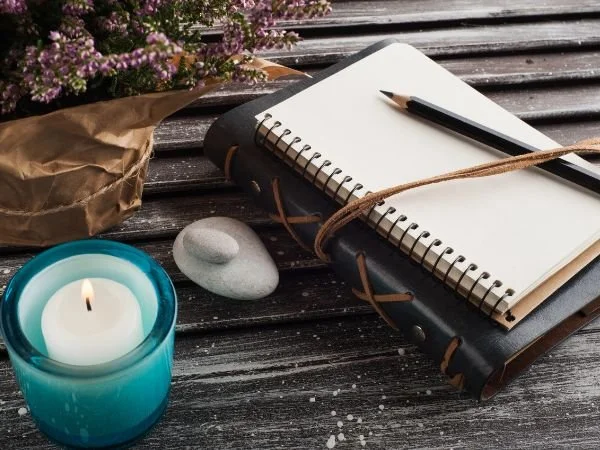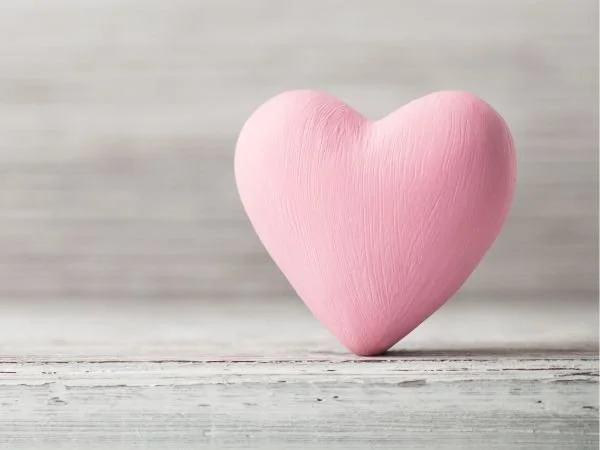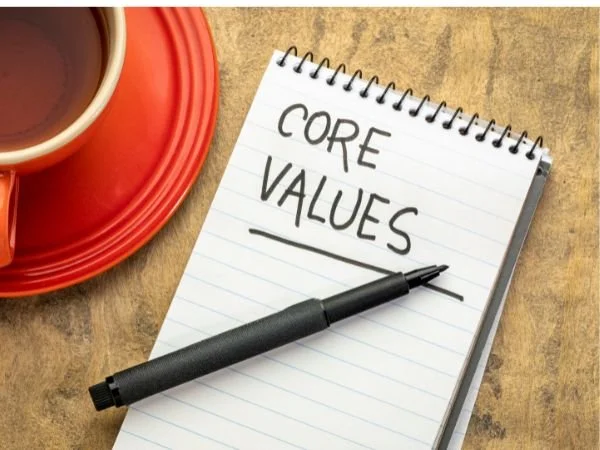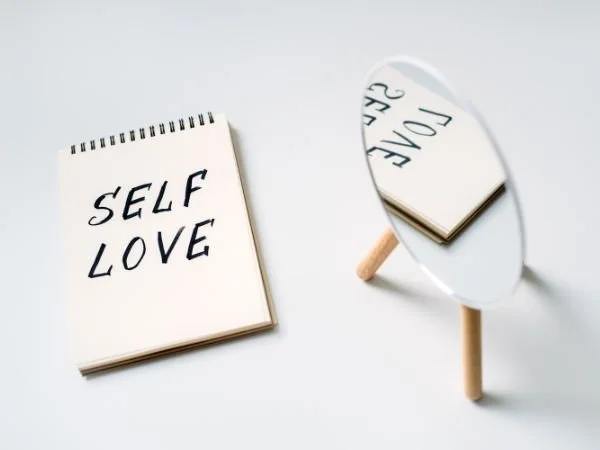136: Grieving a Friendship Breakup That Turned Romantic
Grieving the end of a friendship that turned romantic? This week I answer a listener question about the grief and confusion that comes when a close friendship becomes romantic — and then ends.
Whether you're experiencing a friendship breakup, a "friends-to-lovers" heartbreak, or navigating unspoken feelings, I offer compassionate advice to help you process the pain, find closure (even if it's one-sided), and validate your emotions.
This post contains affiliate links to some of my favorite tools and resources. As an Amazon Associate, I earn from qualifying purchases. Full terms & conditions here.
🎙️ In this episode:
How to grieve a friendship breakup with romantic feelings involved
Why blurred boundaries can deepen the heartbreak
Self-blame, red flags, and learning to trust yourself again
Healing after queer friendships and relationships end
Tips for protecting your heart and rebuilding your social support
Unique challenges in queer friendships and relationships — and how to navigate them with care
Recommended Episodes
Blog Post
Book Recommendation
Resources
New study shows social media use predicted future depression in tweens (Washington Post)
She Says Social-Media Algorithms Led to Her Eating Disorder. Now She’s Suing TikTok and Instagram (Time)
‘Children are entering a hellscape’: the terrifying film about grieving parents taking on social media giants (The Guardian)
Timestamps ⏱️
Intro: 05
Listener Question: 2:02
Outro: 25:33
Have you followed and left a review for New View Advice?
Let me know what you think of the podcast! Podcast followers and ratings help bring new listeners to the show, as well as help me to continue creating content. So if you enjoyed the show, I’d love to ask you to follow and leave a rating on your podcasting platform by:
Head to New View Advice on Apple or Spotify
Click Follow on your podcasting platform
Scroll down (or when promoted) click the 5 star rating!
-
This podcast was transcribed by an AI tool called Castmagic. Please forgive any typos or errors.
Amanda Durocher [00:00:01]:
Welcome to New View Advice with Amanda Durocher. Hey there, beautiful soul. My name is Amanda Durocher and this is New View Advice. If you're new here, this is a healing centered advice podcast where I offer guidance for the healing journey. I do not believe I have all the answers you seek. I believe you have all the answers. You just may need a new View and a little help along the way. Thank you so much for joining me for today's episode.
Amanda Durocher [00:00:22]:
Today I'm answering a listener question from somebody who is grieving the end of a friendship that turned romantic and then fell apart. And a main part of today's question that I really wanted to talk about is the confusion that comes with mixed signals because many times these friendships that turn romantic become very complicated. It's very complicated when romantic feelings become involved. And so we want to talk about navigating that confusion that can come up during the grieving process when these relationships do not work out. Today's question is written from somebody who is queer, but I truly believe that the advice I talk about in today's episode can really apply to all different types of relationships and friendship that turn romantic. And we'll talk about that throughout today's question. My intention for this episode is to help you to feel less confused, help you to navigate the grieving process and to understand that the grief that is arising is natural and normal. And also to offer yourself compassion because this is a difficult situation to be in and it's not easy.
Amanda Durocher [00:01:15]:
So we want to learn how to be kind to ourselves as we navigate these difficult situations. Before I jump into today's question, I wanted to say here up front that if you haven't already, I invite you to check out newviewadvice.com on newviewadvice.com, i have more resources for the healing journey. I have journal prompts, meditations, blogs, blog posts. My blog posts are super long. I have two other writers on the site who are fantastic and write these really short pieces to assist you on the healing journey. My goal with NewView Advice is always to create more content and more resources to help people navigate healing from relationships, trauma, sexual assault, and more. So if you're interested in more resources or checking that out, I invite you to check that out after the episode@newviewadvice.com and with that, let's jump on into talking about grieving the end of friendships that turn romantic. Hey Amanda, just reaching out because I came across your podcast recently and has been super helpful in processing some complex emotions related to a particular situation I found myself in.
Amanda Durocher [00:02:11]:
I'm sorry for the essay below, but I feel like my situation a lesbian relationship isn't covered a lot online. I'm a bisexual woman and my best friend is a lesbian. Recently, things have become more and more intimate between us. For example, we started sleeping in the same bed together and spooning. She's always so complimentary of me as a friend and of my physical appearance. Mutual friends noticed our connection and kept asking us what was going on. I had a trip planned so I decided to ask her about us a couple of days before I left if there was something worth exploring between us. She told me she had gone over it a million times in her head and decided that a relationship between us would end badly and she wanted to protect our friendship.
Amanda Durocher [00:02:49]:
I agreed that we should protect our friendship, but that it might also be nice to explore it as we already spend so much time together and get along so well. I suggested we take time apart to think about it and revisit the conversation when I got back from my trip. She agreed and then spent the last day we had together complimenting me physically and confessing all the time she had wanted to kiss me and act on her feelings. That night again, we slept and spooned in my bed. On my last night before my trip, I left feeling excited about my return. After a couple days, I noticed she was no longer replying to my messages but was replying to group chats we were both in. I asked a mutual friend and found out that less than 24 hours after I left her in my bed, she went on a date with a girl she met on a dating app and that they had gone on a second date the following day. By the time I returned, she had fully integrated this girl into my social group and was inviting her to all our group get togethers.
Amanda Durocher [00:03:36]:
I was gone for only 10 days. We ended up having a face to face chat where she made it clear that while she was incredibly attracted to me, she didn't want a relationship with me. I felt proud of myself because I managed to stay vulnerable and be honest about how she had hurt me and that I would need time to move past my romantic feelings for her. I also asked her why she had stopped replying to me and also muted me on Instagram and she said she was just super busy but would be more mindful moving forward. It wasn't just the rejection that hurt, it was the fact that she then created a social situation that was very difficult for me to navigate. When I got back, I told her she had hurt me, but she made little effort to reach out when I returned and invited this new girl to every social gathering, so it was difficult for me to even have that face to face chat with her. Not surprisingly, I now don't hear from her apart from the odd Instagram meme, which I find insulting. I decided to block her on all channels because I could feel my anxious attachment kicking in and checking for memes from her every day.
Amanda Durocher [00:04:31]:
But now I am processing an intense grief not just for the potential relationship I'd fantasized about. I'm aware that it was a fantasy, but also I have lost my best friend and social circle. I don't want to hang out with them if the new girlfriend is there. I feel stupid for not knowing that she was avoidant before, like I must have missed red flags, but also guilty for blocking her as it makes it feel like there is no future for us as friends or any other capacity. Mutual friends always imply that she does have complex feelings for me and that she struggled with it, but I've never got that impression from her. In our last conversation she was very stoic. How do I navigate this so I don't completely lose her, but also don't gaslight and completely blame myself? I keep trying to make sense of things and the more I think about it, the more I feel like I made it all up. At least that's the easiest way to think because she isn't giving me any closure.
Amanda Durocher [00:05:21]:
Any advice or resources would be super helpful. Please. I feel stuck. Thank you so much for this question. I am so sorry for the situation you are navigating. I don't think you're alone with this. I think that this is a very common situation in all different types of relationships. I think specifically for the queer community, because I will give the caveat here that I am a straight woman, a straight relationship for 14 years.
Amanda Durocher [00:05:43]:
So everything I say about the queer community is from research I did before this episode. But what I've gathered is that this is a very common situation, that friendships can have romantic undertones and that it can be difficult sometimes to tell what's platonic and what's romantic because there aren't those rigid boundaries of like if for me, for example, if I'm hanging out with my straight girlfriends, we're all straight, so there's a boundary there that we don't even have to articulate where sometimes in queer relationships it's not as clear. And so I just want to honor that up front. That one I don't think you're Alone, but two, I think it adds a complexity to these relationships that is worth exploring. But with that, I also want to say that the situation you described here, I know many straight people who have played out the same situation, including the sleeping in the same bed with somebody that they're kind of attracted to. They don't know if there's feelings. Sometimes they're spooning, sometimes there isn't. Should they cross the line? Do they not cross the line? They're just friends.
Amanda Durocher [00:06:39]:
This is a universal experience at the same time. So I want to add that I do see the complexity with the queer experience, but I also want to honor that. I do also see that this is a human experience because I know men and women who have played out this exact same situation. I wanted to say that up front because my advice is going to be a bit more universal. So I just wanted to say that so many people can relate to this situation. People who are queer and also people who are not queer. So first I want to say I'm so sorry. This is definitely challenging.
Amanda Durocher [00:07:08]:
And as you mentioned, I think one of the hardest parts of what you are navigating is losing the chance at romance here, but also losing your best friend and your social circle. That is a lot to lose at one time. That is heartbreaking. And of course you're moving through the grieving process because that's a lot to navigate. And as you mentioned, all you did was go on vacation for 10 days and you came back and it sounds like your world was rocked. Sounds a bit like you ended up in the Upside down and you're like, what is happening here? So I mentioned that because there's a lot of confusion in your question. And I wanted to say, of course you're confused. Of course you are confused.
Amanda Durocher [00:07:44]:
Your whole social circle from what you described was just flipped upside down. Of course you're confused. And from the question I just read, this is a very confusing situation. So no, you did not make this up. Okay, I'm going to be the person to say from what you. What I read here, you did not make this up. I'm not even sure this was completely fantasy. I think that maybe you were fantasizing a bit about what the relationship could turn into.
Amanda Durocher [00:08:10]:
But this wasn't completely fantasy. I talked about limerency fantasy in episode 135 and that was somebody who also had romantic feelings for their best friend. But in that situation, they never discussed those romantic feelings and they weren't mutual. So it's a different type of fantasy to me from what You've described. This is a very complicated situation, and this is a friendship with romantic undertones. And unfortunately, from what you read here, there was no clarity regarding how you both felt. I know you had the one conversation before you left for your trip, but to me, I think what was lacking here was clear boundaries between the two of you and clear conversations about your feelings. Because as I mentioned, I know straight people who have done the sleeping in the same bed thing and the spooning thing with somebody that they have feelings for but aren't technically dating.
Amanda Durocher [00:09:01]:
And it's like, very complicated. It's like, are we lovers? Are we not lovers? Are we going to be together? Are we not? Are we going to try this out? Are we not? Holy moly. That is so complicated. And as sexy as that may sound in the movies, I don't think that's what real relationships are built off of this. Are we? Aren't we? I think in the end, to have a healthy relationship, there has to be clear communication, because clear communication creates boundaries, it creates emotional intimacy, and it also creates safety. And from what you described here, unfortunately, this friend of yours sounds very immature. And to me, the behavior you've described here here is very cruel. It's very cruel how they treated you.
Amanda Durocher [00:09:42]:
And that doesn't sound like a good friend to me. And you deserve so much better. And I just wanted to say all that because you are not crazy. From what I read in your question, it was almost like you were asking, am I crazy? Did I make all this up? You're not crazy. You didn't make this up. And what's really confusing is that this person hasn't really communicated with you, in my opinion, in a mature way. And it sounds like you are somebody connected to your feelings. You articulated a lot of feelings here.
Amanda Durocher [00:10:09]:
You mentioned being vulnerable during your honest conversation. And it sounds like this person is not there. They are unable to meet you where you need them to meet you. And it can be really confusing for us as people connected to our emotions or maybe as empaths, to connect with somebody who is disconnected from their feelings. Because that's what you've described here to me is somebody disconnected from their feelings. My guess is that when you both shared how you felt, this person got scared and they went out and they pursued a whole new relationship. I'm not sure what exactly they were afraid of. I don't know what happened here per se, but I don't think you made it up.
Amanda Durocher [00:10:46]:
They told you how they felt. They told you they thought about kissing you. They told you they thought about other things with you and then they went off and pursued an entirely new relationship and have now, like you said, brought that person into your friend circle with no regard for you and your feelings. That is not kind behavior. That is, to me sounds like somebody who is immature and has some of their own inner work to do. Because that's not how you treat your best friend. I always say in these questions when you're being hard to yourself, ask yourself, how would you treat your best friend? That is not how you treat your best friend. And so whatever is going on with her is all about her, though it has absolutely nothing to do with you.
Amanda Durocher [00:11:25]:
And that is part of the inner work, is that it feels so fricking personal when people are cruel to us, when they're immature, when they hurt us, when they won't give us closure. I'm gonna reassure you here, it has nothing to do with you. She is dealing with her own stuff, but it's a her thing. Okay, so I do wanna reassure you that you're not crazy. This is a very confusing situation and what's going on with her is a her thing. But now that leads me to my next piece of advice, which does that make this situation magically go away? No, of course not. You still have all your feelings and you still need to move through the grieving process. And so with that not being about you, I don't know what red flags you missed.
Amanda Durocher [00:12:01]:
I don't know if there were red flags. I did want to give a little note up here about red flags because you mentioned that you must have missed red flags. Red flags can become a way we lean into self blame. When we see a red flag, we think, oh my God, there was a red flag. I should have seen it. That's not why we look for red flags. We look for red flags just to learn about maybe something we missed. And so that we can go, oh, that was a red flag.
Amanda Durocher [00:12:32]:
Oh my gosh. Okay, that's good for me to know for next time. And often when we're looking for red flags, at least what I found in my opinion, is we're looking for how did we feel in a moment? Did something trigger confusion? To me, confusion is a red flag. When we are in healthy, safe relationships, we don't feel confused all the time. You know, confusion is a defense mechanism I've used for a very long time. That's why I'm familiar with it. Also, self blame is a defense mechanism. If I blame myself for this situation, I don't have to see the truth that somebody just did something really awful that hurt me.
Amanda Durocher [00:13:09]:
Because sometimes it's easier for us to blame ourselves because it's a form of control. It's like, then I control the situation. I can make sure that doesn't happen again. Rather than seeing, oh, my God, my best friend hurt me. Shit, that really fucking hurts. Ow. Rather than, oh, my God, I trusted somebody who broke my heart. I did nothing wrong.
Amanda Durocher [00:13:30]:
I couldn't have stopped that situation. Ugh, what a hard lesson. What a hard moment in time. That, to me, at least in my life, is so much harder to see than, oh, my gosh, well, if I had never opened my heart, if I had never done this, if I had never done that, this would never happen. So I can just blame myself, I can keep myself small, I can close off my heart, and then, boom, I won't get hurt again. That's a defense mechanism. The truth is, we can't control other people. Sometimes we learn red flags along the way.
Amanda Durocher [00:13:58]:
We learn a lot of people aren't necessarily honest. And it takes time. It's taken me to be in my 30s to be able to trust my gut when somebody says something that on paper, I should fully believe them, or on paper, we should be best friends, but my body is telling me differently. There's confusion in my head or there's a feeling in my gut, or when I leave them, for some reason, I can't place my finger on why I feel insecure. And it's my work to see if that's an inner wound coming up or if that's just my body communicating to me like, this person's not for you. You don't feel safe with them. You don't have to force it. But I wanted to bring that up because you mentioned the self blame, and I recently reread Daring Greatly.
Amanda Durocher [00:14:37]:
I highly recommend it. You asked for resources. Brene Brown. Darren Greatly. If you haven't read it, it's a great book on shame vulnerability. But she talks about how blame always leads to shame, and it's not about blaming one another. We can hold each other accountable. We can hold each other responsible.
Amanda Durocher [00:14:52]:
We can see the truth of situations. But it's not about blaming somebody else. It's not about blaming them or blaming yourself because that leads to shame, where we feel like we're the bad person. And you're not a bad person. You're not a wrong person. You're not a broken person. There's nothing wrong with you. Unfortunately, hearts got broken, feelings got hurt, and you're moving through the grieving process.
Amanda Durocher [00:15:14]:
So with your question, I wanted to honor that. Though it's hard sometimes with grief, it just takes time. You know, I really believe when we move through the grieving process, we're moving through the five stages of grief, which is denial, anger, bargaining, depression, and acceptance. I don't believe we move through these in any particular order. And I think that they come in waves and we can come up against many of these phases time and time again. And so to me, it sounds like the confusion can be part of the bargaining phase, where you're trying to figure out how you can keep this friendship. How do I keep it? How do I keep it without gaslighting myself or blaming myself? And the truth is, my guess is you're going to have to accept the end of this friendship. I hope that you can get to a point where maybe you could still be in the same room with this person, because I did want to talk about how I hope you don't have to lose all your friends.
Amanda Durocher [00:16:00]:
You don't have to lose your social circle. I think that when we are grieving friendships and we're healing from heartbreak, we need space from that person. So I commend you for blocking them. I think that can be really hard for people, but I think it's super healing. I will die on the hill that I don't think we were ever meant to be this connected to each other. Social media is unhealthy. I can link some articles, but I don't think we argue that at this point. Social media is unhealthy.
Amanda Durocher [00:16:24]:
It is not good for our mental health. And so when you are using social media, it's important to find ways that it doesn't harm you. You find ways to cater your feed to you. You find ways to block what causes you harm and to only allow in what feels good for you. If you find that it is not helpful for your mental health, I invite you to delete the app, at least for time being, because it's not healthy. Life is so much better when we're not constantly comparing ourselves to each other or connected to people who have hurt us. So this woman sending you Instagram memes when you're not talking. Not cool.
Amanda Durocher [00:16:58]:
That is not something that existed before cell phones and social media. I don't think that's healthy. I think that you deserve the time to fully move through all your feelings regarding this, especially because this woman has proven to you that she's not responsible enough with your feelings and your heart. And you deserve friendships and you deserve romantic partners who take your Feelings into consideration. You deserve to have your feelings considered. You deserve for somebody to say they're sorry. Doesn't sound like this woman ever said she was sorry for what she did. Of course you feel confused.
Amanda Durocher [00:17:27]:
Someone you trusted broke your heart. Devastating. We all go through it. It's part of the human experience. Trusting the wrong people or trusting somebody who's not emotionally mature or trusting somebody who's not ready for our heart. Trusting somebody who doesn't know how to be with their own feelings so they will never know how to be with ours. Part of the human experience, part of growing up. And so you are currently moving through the grieving process, like you said.
Amanda Durocher [00:17:50]:
And so with everything I've said here, I wanted to mention that because your feelings aren't going to go away overnight, you might come into denial again or have anger or bargaining the depression, but you will move into acceptance as you continue to feel your feelings. The truth about grieving is allowing yourself your emotional experience and finding ways to move those feelings. And for me, with heartbreak, creativity is so helpful. I write poems, I write songs. That always inspires me when I have a big experience. I write stories. That's why so much art, I think, is based off of heartbreak. It's why some of our favorite songs are about heartbreak.
Amanda Durocher [00:18:28]:
Honestly, when I was reading your question, I kept hearing the song how am I supposed to Live without you by Michael Bolton. It's an older song. I don't know if you know that song. I don't even know if that's how you feel. But like, I invite you to just throw on some heartbreak music and allow these artists throughout history to help you to feel less alone when you're navigating this. Because our hearts breaking is so painful. It's true pain. I wish we honored it here more on earth.
Amanda Durocher [00:18:54]:
It's honestly a spiritual experience to have your heart broken. I believe to truly have your heart broken. Because what we find through heartbreak is. It's painful. But through the pain, we find parts of ourselves that maybe we forgot about. We connect back to ourselves. We honor ourselves. And to me, that's a spiritual experience.
Amanda Durocher [00:19:11]:
Through this process, I hope that you honor you. And what does that look like? It's telling yourself you're not crazy. It's telling yourself you didn't make this up. It's learning to trust yourself and how you felt. It's also honoring that you took a chance on love. And that's part of the honoring and part of the spiritual experience. Because part of this process that I found when my heart breaks Is asking myself, asking my soul, why? Why did this happen? Why did I go through this pain? And it's through honoring my feelings. It's through seeing the situation clearly.
Amanda Durocher [00:19:45]:
It's through learning and growing that I grow and I learn and I become a more grounded person, a more stable person, and a more safe person for the people who do enter my life and a more safe person for myself. I think that's why we heal and why we also feel heartbreak is so that we can connect back to ourselves and the love of self. Because so often when we find ourselves in these situations and our heart breaks, it's because we put a story attached to this person. Like, if I was with this person, I'd feel X, I'd feel complete, or I'd feel loved. And the truth is we have the power inside us to feel those ways. It does not mean we don't desire romantic partnership. That's not what I'm saying. But I'm just saying that when we can look at the stories we tell ourselves regarding the relationship that has ended, we're also able to free ourselves and to heal and to move forward in a more stable way.
Amanda Durocher [00:20:36]:
And so, before I wrap up this question, I also did want to speak a bit to the queer experience, because I know that that was part of your question and you felt like that wasn't seen. And I do want you to feel seen. And so from my research, because as I mentioned, I am a straight woman. What I have gathered about queer relationships is that this can be a common situation because of a few reasons. One is that there are unclear boundaries. So while queer people are creating relationships, there are these unclear boundaries. Like the fact that you were sleeping in the same bed and spooning without the clarity of what that meant is very confusing. And that's not likely to happen between me and a straight woman.
Amanda Durocher [00:21:16]:
That is a very different dynamic that you are experiencing. And my advice for moving forward is to understand how some of these behaviors that though they may be normalized within friendships, if you are feeling romantic feelings, you may have to articulate and create boundaries for yourself to keep yourself safe. Because that's what it is, is that when the lines are crossed with romance and friendship, that sense of safety and security can be rocked because the relationship is unclear. And so I think it's incredibly important for you moving forward to find ways to be clear within your relationships and to set those boundaries so that you can feel safe and you can trust and you can develop those romantic feelings over time if you want to. But that it's developed in a way where it's articulated that you both have the same emotional investment and you'd like to explore it. Because that's the other thing I think happens in these type of situations where friendships turn romantic is that there's a lot of mixed signals. So say you're having deep conversations. Well, if you're looking to be with a woman and have deep conversations, maybe your love language is triggered and you're like, oh my gosh, I feel romantic feelings for you.
Amanda Durocher [00:22:26]:
Or the other person might just be like, oh my gosh, this is like my best friend. We're having this deep conversation. This is what I'm looking for in friendships. And so these lines are blurred because there can be sexual attraction to one another in ways that I don't experience in my straight friendships. Right. I don't feel that way. Or if I have a queer friend, they know I'm straight and we're good. Like, it's a different type of relationship where when I speak with men and I hang out with Evan's friends or I hang out with men in general, there's like these boundaries I have that if they were crossed, I would say something because I would know that a line was being crossed.
Amanda Durocher [00:23:01]:
Or I think sometimes in these queer friendships, those lines can be blurred and be crossed more often if you don't know your own boundaries. So that's my take on this. Again, I'm a straight woman and this is from research I did. But I think it's important for you to know your boundaries and what you're comfortable with in friendships versus romantic relationships and how you want to go about it in the future. If a friendship starts to feel romantic for you, when do you want to speak on those feelings? How do you want to articulate that? How do you want to navigate that to not lose the friendship? But I think these type of situations in queer and non queer relationships happen because there is unclear boundaries, mixed signals, unequal emotional investment, and not enough articulation and healthy communication around what is happening emotionally. And when we are too afraid to speak about our feelings, it can create a lot of muck and a lot of uncertainty and unclarity. And I think this is what happened with you and your friend is that there was a lot of unspoken between you two and there's still a lot of unspoken, which is what's causing you a lot of confusion. You're like, I don't know what's happening.
Amanda Durocher [00:24:14]:
I think that's what's causing you a lot of confusion, that there's still a lot unspoken. And unfortunately part of life is learning is that not every relationship will have closure and that can be difficult to move past. And we can talk about that more in another episode if you're still struggling to move past this relationship and find closure. But I really think the closure happens the more we connect back to our own heart and feel our feelings and move through our full emotional process. That's how I find we find real closure, because also somebody can tell us the things we want to hear. But if we haven't moved through our own emotional process, there still may not be closure. That person can help us to receive closure. That is true when somebody takes accountability when we are seen for our emotional experience.
Amanda Durocher [00:24:52]:
That helps to create closure. Because oftentimes there's an unseen part of us that wants to be met that can be incredibly helpful. It just doesn't always happen. So we have to kind of learn how to do that for ourselves. I hope that makes sense. Last thing I always like to say before I wrap up these episodes is please be kind to yourself. Please. What you are navigating is hard.
Amanda Durocher [00:25:08]:
What you're navigating is confusing. What you're navigating is a broken heart. And as you navigate healing your heart, remember that you are worthy of love. You deserve friends who are trustworthy. You deserve people who are safe in your life. I am sending you so much love as you continue to navigate this situation. I hope something in this answer was helpful. Thank you so much for this question.
Amanda Durocher [00:25:33]:
Thank you so much for joining me for another episode of New View Advice. As always, I am so grateful to have these conversations each week. If you have a question you'd like to hear answered on a future episode, I invite you to reach out. You can reach out@newviewadvice.com? or you can email me at contactewadvice.com but I am currently thinking of doing two questions a week, doing one on YouTube and one via Spotify. So if you have a question, please reach out. Thank you again for joining me for another episode of Newbie Advice. As always, I hope I was able to offer you new viewers on whatever you're going through. Send you all my love.
Amanda Durocher [00:26:04]:
See you next time.


































